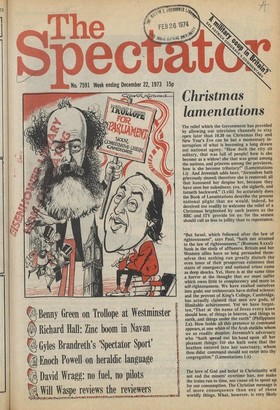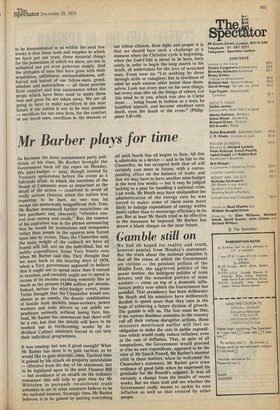Christmas lamentations
The relief which the Government has provided by allowing our television channels to stay open later than 10.30 on Christmas Day and New Year's Eve can be but a momentary interruption of what is becoming a long drawn out national agony. "How doth the city sit solitary, that was full of people! how is she become as a widow! she that was great among the nations, and princess among the provinces, how is she become tributary!" (Lamentations 1.i) And Jeremiah adds later, "Jerusalem hath grievously sinned; therefore she is removed: all that honoured her despise her, because they have seen her nakedness; yea, she sigheth, and turneth backward." (I.viii) So accurately does the Book of Lamentations describe the present national plight that we would, indeed, be deceived too readily to welcome the relief of a Christmas brightened by such jesters as the BBC and ITV provide for us: for the season should call us less to jollity than to repentance.
"But Israel, which followed after the law of righteousness", says Paul, "hath not attained to the law of righteousness." (Romans 9.xxxi) Sunk in the sloth of affluence, Britain and her Western allies have so long persuaded themselves that nothing can greatly disturb the even tenor of their prosperous existence that states of emergency and national crises come as deep shocks. Yet, there is at the same time a horror at the thought that we must suffer which owes little to complacency and more to self-righteousness. We have exalted ourselves into gods; our technocrats have defied science; and the provost of King's College, Cambridge, has actually claimed that men are gods, of illimitable achievement. Yet we have forgotten,"That at the name of Jesus every knee should bow, of things in heaven, and things in earth, and things under the earth" (Philippians 2.x). How feeble all this pretence to command appears, at one whim of the Arab sheikhs whom we so readily despise; Jeremiah's adversary who 'bath spread out his hand upon all her pleasant things: for she hath seen that the heathen entered into her sanctuary, whom thou didst command should not enter into thy congregation." (Lamentations 1.x) The love of God and belief in Christianity will not end the miners' overtime ban, nor make the trains run to time, nor cause oil to spout up for our consumption. The Christian message is of more consequence than any of these worldly things. What, however, is very likely to be demonstrated to us within the next few weeks is that these tools and supplies in which we have put our trust, these material things for the possession of which we slave, are not in unlimited nor yet even generous supply. And the attitudes of man that have gone with their acquisition, selfishness, uncharitableness, selfhatred and hatred of our fellow-men, greed, atheism and materialism — all these provide little comfort and less sustenance when the props which have been used to make them wax and grow fat are taken away. We are all going to have to make sacrifices in the near future if the nation is not to be rent asunder — sacrifices for our own lives, for the comfort • of our loved ones, sacrifices in the interest of our fellow citizens. How right and proper it is that we should face such a challenge at a moment when the Christian cycle is beginning, when the God-Child is about to be born, born solely in order to begin the long march to his death, all undertaken for the love of wretched man. From now on "Let nothing be done through strife or vainglory; but in lowliness of mind let each esteem other better than themselves. Look not every man on his own things, but every man also on the things of others. Let this mind be in you, which was also in Christ Jesus . . . being found in fashion as a man, he humbled himself, and became obedient unto death, even the death of the cross." (Philippians 2.iii-viii).



































